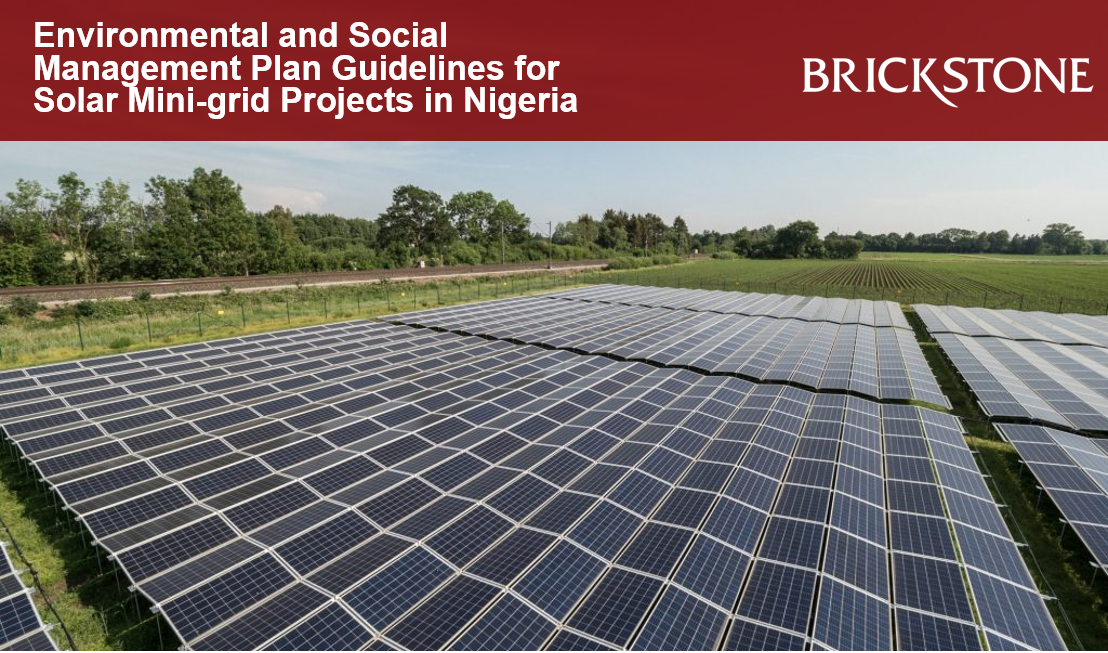Environmental and Social Management Plan Guidelines for Solar Mini-grid Projects in Nigeria
On the 15th of March, 2022, the Federal Government, within the framework of the Nigerian Energy Support Programme (NESP), launched the Environmental and Social Management Plan Guidelines for Solar Mini-grid Projects in Nigeria, 2022.
The Guideline is a simplified framework for carrying out Environmental and Social Impact Assessment (ESIA) for solar mini-grid projects in Nigeria, whilst saving costs and providing a less cumbersome process for Developers for the procurement of an EIA certificate.
This article by Brickstone reviews institutional publications on the Environmental and Social Management Plan Guidelines, its objectives, and major highlights of the provisions.
The Environmental and Social Management Plan Guidelines for Solar Mini-grid Projects
According to the Rural Electrification Agency, Nigeria faces significant challenges in energy access, and in an attempt to curb it, led to the rapid rise in the deployment of renewable energy projects, particularly solar mini-grid projects. This, and the need to set forth and enforce mitigation, monitoring and institutional frameworks to be taken during the implementation and operation of such projects to ensure environmental protection in Nigeria, are the major rationale behind the enactment of the ESMP guidelines. This is to alleviate and ameliorate the adverse environmental and social impacts and conditions accruing from the solar mini-grid projects activities.
In exercise of the powers conferred on the Federal Ministry of Environment by the Environmental Impact Assessment (EIA) Act, the ministry launched the Environmental and Social Management Plan Guidelines for Solar Mini-grid Projects in Nigeria.
The Guidelines also provide a less cumbersome process for Developers for the procurement of an EIA certificate, compared to the EIA Procedural Guidelines, 2017.
By the enactment, project developers and operators must conform with the set of measures contained in the ESMP, and having completed the stages in guidelines, they will be granted the final approval to implement and operate Solar mini-grid projects in Nigeria.
Upon approval, optional issuance of an EIA certificate will be issued to Proponents.
Objectives of the ESMP for Solar mini-grid projects in Nigeria
The following are the core objectives of the Guidelines: –
- To ensure that the implementation of the project is carried out in an environmentally and socially sustainable manner.
- To provide information about the scope of adverse environmental and social risks and impacts expected during subproject planning, construction and operation; describe the approach to mitigation and monitoring actions to be taken; and cost implications.
- To clarify the roles and responsibilities of Rural Electrification Agency (REA), private sector mini grid developers and operators, and other stakeholders with regard to Environment and Social due diligence, management of risks and impacts, and monitoring.
- To provide the project implementers with an Environment and Social screening process and risk management procedures that will enable them to identify, assess and mitigate potential E&S impacts of subproject activities.
Process and Requirements for the Procurement of an ESMP Approval for Solar mini-grid projects in Nigeria
The Guidelines summarily contemplate a 5-stage process for an ESMP approval:
- Submission of Project Documentations to the Federal Ministry of Environment and inhouse verification exercise.
- Scoping exercise as directed by the Federal Ministry of Environment and project registration.
- Preparation of draft ESMP by the Federal Ministry of Environment accredited consultant.
- Public disclosure by proponent. (Optional)
- Final approval of ESMP and issuance of EIA Certificate.
Post ESMP Approval Activities for Solar Mini-grid Projects in Nigeria
After approval and the optional issuance of an EIA certificate, the Guidelines require the Federal Ministry of Environment to monitor approved Solar Mini-grid Projects from site preparation to operation.
This is to ensure strict compliance with the measures in the ESMP and conditions for approval.
Though with primary coordination to be undertaken by the Federal Ministry of Environment, the oversight and supervision of these activities integrates all relevant stakeholders at federal, state, and local levels to ensure efficiency.
There are essentially three Post ESMP Approval Activities for Solar Mini-grid Projects in Nigeria to be carried out by the Federal Ministry of Environment.
They include:
- Undertake an Impact Mitigation and Monitoring (IMM) exercise upon commencement of construction to ensure the implementation of ESMP. This is essentially carried out in the Construction Stage of Solar Mini-grid Projects.
- Impacts and site rehabilitation monitoring to be carried out at the site to confirm compliance with the guidelines. This is also known as the Decommissioning Stage of Solar Mini-grid Projects.
- Routine compliance monitoring with audit exercise, to be carried every 3 years by accredited consultants. This is the Operational and Maintenance Stage of Solar Mini-grid Projects.
Conclusion
The ESMP guidelines for Solar mini-grid projects in Nigeria is an encompassing document that provides a simplified step-by-step guide for developers and regulators on the activities to be carried out toward the approval of an ESMP, during the lifetime of a solar mini-grid as well as during project decommissioning.
It creates an enabling environment for easy development of solar mini-grid projects in Nigeria, whilst ensuring economic, social and environmental sustainability.
Download template for ESMP for Clean Solar Mini-grid Projects here.





